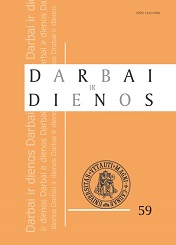Šnipų žaidimai aušrininkų organizacijoje XX amžiaus pirmojoje pusėje
Spy games and the Aušrininkai
Author(s): Ugnė Marija AndrijauskaitėSubject(s): Cultural Essay, Political Essay, Societal Essay
Published by: Vytauto Didžiojo Universitetas
Keywords: Aušrinė; aušrininkai; socialistai revoliucionieriai; bolševikai; slaptoji policija; Aušrininkai; socialist revolutionaries; bolsheviks; secret police
Summary/Abstract: Santrauka. Aušrininkai – pirmoji lietuvių jaunimo organizacija, įkurta 1910 metais. Nepriklausomoje Lietuvoje ši organizacija rėmėsi socializmo, individualizmo ir laisvamaniškomis idėjomis, perimtomis iš kairiųjų Rusijos eserų ir pritaikytomis vietos sąlygoms. Pagrindiniai aušrininkų veiklos centrai – mokyklos, gimnazijos ir universitetas. Organizacija, pabrėždama savo švietėjiškos veiklos svarbą, leido žurnalą „Aušrinė“, knygas, buvo įsteigusi knygynėlį. Nors aušrininkų organizacija nebuvo gausi, jos įtaka visuomenėje buvo didelė, todėl ji tapo įdomi saugumo organizacijoms ir politinėms partijoms, kurios siekė patraukti aušrininkų jaunimą į savo pusę. Dėl to organizacijos nariai, vadinamieji aušrininkai, nuolatos atsidurdavo įvairių „šnipų žaidimų“ epicentre. Straipsnyje siekiama parodyti, kokios institucijos ir organizacijos oficialiais bei neoficialiais būdais domėjosi aušrininkais, kokie buvo pagrindiniai aušrininkų stebėjimo bei sekimo motyvai ir rezultatai. Aušrininkai were the first Lithuanian youth organization, founded in 1910. Their main principles were socialism, individualism, and free thought. The organization had its own magazine Aušrinė, which gave the name to the movement of Aušrininkai. Although Aušrininkai did not have many members, their influence in Lithuanian society was rather large. Because of that, Aušrininkai were always drawn into various “spy games.” At first, they had become of interest to the Communists, and there have been several attempts to infiltrate Communists into the Au rininkai organization in order to make them join the Lithuanian Communist movement. However, none of these attempts was successful. The Lithuanian State Security Department believed that this organization was quite dangerous because their revolutionary ideas were gaining support among numerous peasants. Aurininkai opposed both the rule of the Lithuanian Christian Democratic Party and Antanas Smetona’s presidential rule. Some members of Aušrininkai participated in the Tauragė uprising, and in 1929 made an attempt to assassinate Prime Minister Augustinas Voldemaras. For these reasons Aušrininkai were constantly shadowed by intelligence agents. However, the latter had but a dim understanding and little knowledge of their ideology, so Aušrininkai were often mistaken for Communists, and the agents themselves were quite often exposed. What is more, some members of the Aušrininkai organisation were involved in espionage activities themselves. Knowing that they were under surveillance, Aušrininkai would sometimes use code letters as their means of communication. In 1933, with some help from the Nazis, the State Security Department obtained important documents, including letters from members of Aušrininkai who had formed a Union of Socialist Revolutionaries Maximalists in exile. Those letters helped Lithuanian security agents to understand the organization and its principles better.
Journal: Darbai ir dienos
- Issue Year: 2013
- Issue No: 59
- Page Range: 119-137
- Page Count: 19
- Language: Lithuanian

